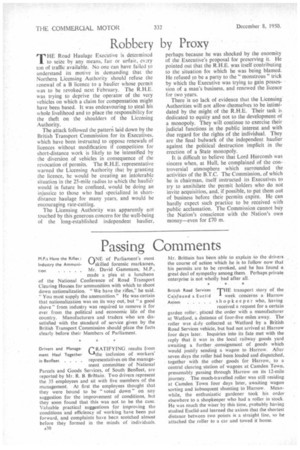Robbery by Proxy
Page 32

If you've noticed an error in this article please click here to report it so we can fix it.
THE Road Haulage Executive is determined to seize by any means, fair or unfair, ev:ry ton of traffic available. No one can have failed to understand its motive in demanding that the Northern Licensing Authority should refuse the renewal of a B licence to a haulier whose permit was to be revoked next February. The R.H.E. was trying to deprive the operator of the very vehicles on which a claim for compensation might have been based. It was endeavouring to steal his whole livelihood and to place the responsibility for the theft on the shoulders of the Licensing Authority.
The attack followed the pattern laid down by the British Transport Commission for its Executives. which have been instructed to oppose renewals of licences without modification if competition for short-distance work is likely to be intensified by the diversion of vehicles in consequence of the revocation of permits. The R.H.E. representative warned the Licensing Authority that by granting the licence, he would be creating an intolerable situation in the 25-mile radius to which the haulie'r would in future be confined, would be doing an injustice to those who had specialized in shortdistance haulage for many years, and would be encouraging rate-cutting. The Licensing Authority was apparently not touched by this generous concern for the well-being of the long-established independent haulier, perhaps because he was shocked by the enormity of the Executive's proposal for preserving it. He pointed out that the R.H.E. was itself contributing to the situation lot which he was being blamed. He refused to be a party to the " monstrous " trick by which the Executive was trying to gain possession of a man's business, and renewed the licence for two years. There is no lack of evidence that the Licensing Authorities will not allow themselves to be intimidated by the might of the R.H.E. Their task is dedicated to equity and not to the development of a monopoly. They will continue to exercise their judicial functions in the public interest and with due regard for the rights of the individual. They are the final bulwark of the independent haulier against the political destruction implicit in the erection of a State monopoly. It is difficult to believe that Lord Hurcomb was sincere when, at Hull, he complained of the controversial atmosphere which surrounded the activities of the B.T.C. The Commission, of which he is chairman, itself instructed its Executives to try to annihilate the permit holders who do not invite acquisition, and, if possible, to put them out of business before their permits expire. He can hardly expect such practice to be received with public acclamation. The Commission cannot bay the Nation's conscience with the Nation's own money—even for 00 m.




























































































